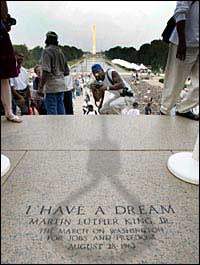'Dream' words misused, King says
Melanie Eversley, The Atlanta Journal-Constitution, August 29, 2003
WASHINGTON -- Forty years to the day after the Rev. Martin Luther King Jr. laid out his dream for America, the son of the civil rights leader admonished people who use King's words to advance causes he said King would not have supported.
Martin Luther King III, president of the Southern Christian Leadership Conference, said he is offended when opponents of affirmative action quote the line from his father's "I Have a Dream" speech that Americans should be judged "not by the color of their skin but by the content of their character." His father delivered the speech at the culmination of the Aug. 28, 1963, March on Washington.
The younger King made the comments in a news conference at the National Press Club in Washington, where he spoke about his father's legacy and where America stands in terms of civil rights.
"In recent years, I confess that I personally have gotten pretty annoyed when opportunistic politicians have attempted to twist the meaning of some of the words of my father's, particularly in the 'I Have a Dream' speech, to fit their political agendas," King told reporters.
"You really just can't take a part of that vision," he said. "You must embrace the entire vision to understand who he was and what he envisioned and what he felt could make our nation and our world a better place for all of God's children."
King was joined by the Rev. Walter Fauntroy, a former District of Columbia congressman who helped organize the original March on Washington; activist Dick Gregory; and the Rev. E. Randel Osburn, executive vice president of the SCLC. All are part of the new "Coalition of Conscience" that King has helped organize since last Saturday's commemoration in Washington of the 40th anniversary of the march.
On Thursday, the coalition launched a 15-month "rolling mobilization" in which it will visit cities that have experienced racial tension, beginning with Cincinnati, where African-Americans and police have clashed.
In mid-September, the group plans to visit Belle Glade, Fla., where local authorities ruled an African-American man's hanging as a suicide, though others suspected foul play.
Fauntroy also announced that the coalition is moving toward ensuring that as many people as possible register to vote on Jan. 15 as a present to the late King on his birthday
See:
http://www.ajc.com/news/content/news/0803/29kingson.html Hanging awakens ghosts of past
Marcus Franklin, St. Petersburg Times, August 28, 2003
A black man's death has split Belle Glade along racial lines. While an inquest ruled it suicide, many contend he was lynched.
BELLE GLADE - The tale bears elements of another era: a black man's death by hanging, rumors of intimacy between him and a white woman, and palpable racial tension and distrust.
But the setting is not Jim Crow Mississippi. It's this modern-day Everglades farming town of 15,000 on the southern shore of Lake Okeechobee in western Palm Beach County.
The first spark flared one rainy morning in May when Bernice Golden found her 32-year-old son hanging from a schefflera tree in the expansive yard outside his grandparents' home.
After the medical examiner ruled Feraris S. "Ray" Golden's death a suicide, after investigators insisted no evidence of foul play turned up and after a circuit judge took the extraordinary step of holding a public inquest and concluded Golden killed himself, some still refuse to accept the official version.
Insisting police botched the investigation, they leave room for the possibility that someone lynched Golden, that his 5-foot 6-inch, 131-pound body became, in the words of singer Billie Holiday, strange fruit.
Three months later, Golden's death and the outcry that followed have crystallized divisions among Belle Glade residents, largely along racial lines. With some exceptions, black and white residents have retreated into two visible camps: The former, suspicious of a nearly all-white Police Department, believes Golden could have been lynched, possibly for dating a white policeman's daughter. The latter thinks Golden committed suicide and that should be the end of it.
A black state representative has called for the resignation of the city's white public safety director. A white city commissioner called the representative an outsider, prompting comparisons to segregationists who used the word to deride civil rights activists. The public safety director has accused some of exploiting the issue for political gain. Now, agencies outside Belle Glade, including the FBI and the U.S. Civil Rights Commission, are investigating.
The events also have lifted the cover of calm off the city's stark racial disparities....
See:
http://www.sptimes.com/2003/08/28/State/Hanging_awakens_ghost.shtml
